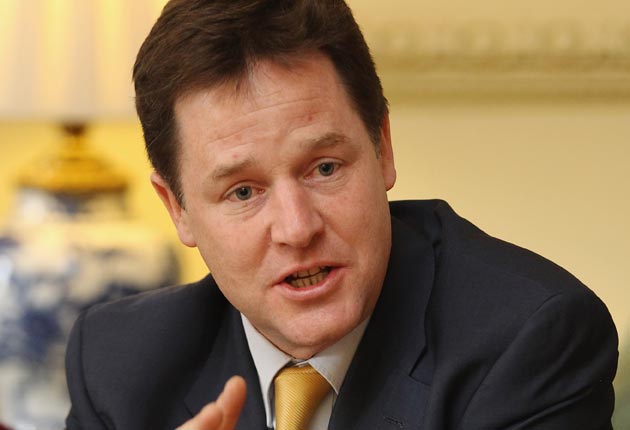Andrew Grice: Sniping over vote reform changes things irrevocably between Clegg and Cameron
Inside Westminster

After the Coalition was formed almost a year ago, Nick Clegg and his advisers resolved that unity between the two parties would be the top priority for the Government's first year.
There were two reasons: the obvious one of showing that "coalition works", a potentially huge long-term prize for the Liberal Democrats. The second was the referendum on the voting system that takes place next Thursday.
Mr Clegg knew that the threat of more hung parliaments and "weak government" would be among the main weapons deployed by staunch defenders of the current first-past-the-post system as they attacked the alternative vote. So he was utterly determined that the Lib-Con Coalition would provide strong government. This helps to explain why – until recently – there have been so few public disputes between the two parties and why the Liberal Democrats signed up so readily to deep spending cuts and other unpalatable decisions.
So far, so good. But Mr Clegg and his team failed to anticipate the deadly argument that AV would mean "broken promises" by parties that junked their manifesto pledges in the horse-trading that inevitably follows an inconclusive election. This has turned out to be a trump card for the anti-AV brigade. It resonated because of Mr Clegg's U-turn over university tuition fees.
The other trump card is David Cameron. He sanctioned – or at least did not stop – the No camp's personal attacks on Mr Clegg, who feels bruised as the fees hike was Tory rather than Liberal Democrat policy.
When he finally woke up to the threat a Yes vote would pose to his premiership, Mr Cameron showed a ruthlessness he had not displayed since last year's election. Tory MPs, fed up with concessions to the Liberal Democrats, were delighted to see it. Mr Clegg was again the victim: it meant ripping up a gentlemen's agreement under which the two leaders would keep a low profile during the referendum campaign and prevent personal sniping. The third part of the agreement – no crowing by the winner – is still intact, it seems.
True, the votes will not be counted until next Friday. But this weekend the pessimism in the Yes camp is palpable; the No lobby senses victory. "We haven't got a game-changer," said one prominent AV supporter. "The No campaign had one – David Cameron."
A year ago, Team Clegg understandably thought their man would be an asset in the referendum. Although the election result was disappointing, he had a good war. On the face of it, Yes to change is a more positive message than No, so who better to front it than nice Nick? Who could have predicted then that Mr Clegg would become more of a hate figure for the Coalition's opponents than Mr Cameron or the Chancellor George Osborne? Mr Clegg has certainly played a prominent role in the referendum campaign – but for the No rather than Yes camp. His picture adorns the No lobby's propaganda (along with that broken promise on fees). The Labour No to AV organisation tells us: "AV would lead to more hung parliaments, backroom deals and broken promises. Tell Nick Clegg No." It seems to be working. The sense of betrayal among Labour supporters over his decision to join forces with the Tories still runs deep. "I support AV but I'm not going to give that bastard what he wants," is a frequent reply from Labour-inclined voters on the doorsteps and in focus groups.
Nice Nick to Nasty Nick in a year. Whenever Mr Clegg popped up to make a speech on AV, the Yes camp's ratings appeared to go down, according to insiders. Ed Miliband came out in support of AV but refused to step on to a platform with him. The Labour leader would be photographed cuddling up to Vince Cable but not the apparently toxic Mr Clegg.
With Labour MPs split down the middle, Mr Miliband decided not to expend vast amounts of capital on a row with his own party, even though the votes of Labour supporters could potentially have turned the referendum in the Yes lobby's favour.
Where will the Coalition go from here? The atmosphere will change, though it was always going to once the two parties went head-to-head in elections and a referendum. Scars from the nastier than expected scrap over AV will remain. Mr Cameron and Mr Clegg will doubtless pledge business as usual and rule out policy sweeteners for the loser. Despite speculation about an early general election, they will dismiss the idea that one party might walk out of the Coalition before its scheduled end date of 2015. Indeed, both remain bound together for the long haul: the Tories to sort out the economy and the Liberal Democrats to show that "coalition works".
But the Cameron-Clegg relationship will change. "Nick has had a reminder of just how ruthless the Tory machine and the Tory press can be," one close ally said. Mr Clegg has no intention of being the sole "Coalition unity figure" while colleagues such as Chris Huhne and Mr Cable kick lumps out of the Tories; that would leave him in a weakened and dangerous place inside his own party.
The ruthless Mr Cameron may find that his Deputy Prime Minister develops a ruthless streak too.
Join our commenting forum
Join thought-provoking conversations, follow other Independent readers and see their replies
Comments
Bookmark popover
Removed from bookmarks